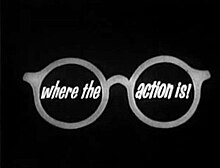Where the Action Is is a music-based television variety show that aired in the United States from 1965 to 1967.[1] It was carried by the ABC network and aired each weekday afternoon. Created by Dick Clark as a spin-off of American Bandstand, Where the Action Is premiered on June 28, 1965. The show was another step in the then-current trend of entertainment programs that targeted the teenage audience by focusing on pop music, following in the footsteps of Shindig! (premiered in the fall of 1964, also on ABC) and Hullabaloo (premiered January 1965 on NBC). Dick Clark's voice could be heard doing the artist introductions, and he sometimes did filmed interviews.
| Where the Action Is | |
|---|---|
 Title card | |
| Genre | Musical Rock 'N' Roll Variety |
| Created by | Dick Clark (also host-announcer) |
| Country of origin | United States |
| Production | |
| Running time | 25 Minutes (1965) 30 Minutes (1965-1967) |
| Production company | Dick Clark Productions |
| Original release | |
| Network | ABC |
| Release | June 28, 1965 – March 31, 1967 |
Background
editThe show was hosted by Linda Scott and Steve Alaimo, who sang numbers between guest performances.[2] Ms. Scott had a few hit singles as a teenager in the early 1960s; she was only 20 when "Action" premiered. Also appearing were Keith Allison (a Paul McCartney look-alike who later became a member of Paul Revere and the Raiders) and Laura Nyro. Typically, the show featured two or three performers lip-synching their recent hits with a bunch of teenagers clapping and swaying in the background, and a dance segment featuring the Action dancers. There would occasionally be an interview segment. A few episodes featured only one performer, such as Herman's Hermits or James Brown.
Originally intended as a summer replacement and broadcast at 2 P.M. EDT, the show was successful enough for it to continue throughout the 1965–66 TV season, with a change in time period to 4:30 P.M. Eastern time following the horror soap opera Dark Shadows. Both programs attracted a young audience who watched the shows after school. It was in black and white.
The show's theme song, "Action", became a hit single for Freddy "Boom Boom" Cannon, peaking on the charts (#13) in September 1965. Most of these black-and-white telecasts were taped at various locales in Southern California. A handful of segments were taped elsewhere around the US. The theme song was written by Steve Venet and Tommy Boyce. Later, Boyce co-wrote songs for The Monkees.
The program had its own stable of performers, most notably Paul Revere & the Raiders, who served as the de facto house band. Easily identified by their Revolutionary War costumes, the band had several Top 40 hits in the '60s thanks in part to the exposure they received on "Where The Action Is". Their lead singer, Mark Lindsay, with his signature ponytail, became one of the most popular teenage idols of the decade, gracing the covers of countless teen magazines. The Raiders also recorded the "Action" theme song for their 1965 album "Just Like Us" for which Dick Clark wrote the liner notes. When the group departed the show in 1966, they were replaced by The Robbs and The Hard Times. Other regular performers on Action included the dance troupe Pete Menefee and the Action Kids. Individual episodes featured a wide range of guest performers, as detailed below. Tina Mason was a regular singer being promoted by Dick Clark on the show. She met on the set and later married Phil Volk, the bass player for Paul Revere and the Raiders. They married on the second anniversary of the show's premiere, June 27, 1967.
The weekday program was cancelled on March 31, 1967, with the network giving its local affiliates the time slot. However, members of the program's mainstay band Paul Revere and the Raiders (with lead vocalist Mark Lindsay) hosted very similar follow-up shows: both Revere and Lindsay hosted Happening '68, a Saturday afternoon follow-up to American Bandstand, and a weekday version of the same show, It's Happening, from 1968 to 1969. Both shows were produced by Dick Clark's production company for ABC.
Regulars
edit- Dick Clark (Host-Announcer. Except for a brief cameo at the beginning of the pilot and at the end of the final episode, he only appeared in off-camera voice-overs to introduce performers)
- Paul Revere and The Raiders (1965-1967)
- The Robbs (1966–1967)
- Keith Allison
- Steve Alaimo (Co-Executive Producer & Host)
- Tina Mason (Temporary Replaced: 1966)
- Linda Scott (Co-Hostess/Hostess: 1965-1966 & 1967)
- The Action Kids (1965-1967)
- The Knickerbockers (1966)
- The Hard Times (1966-1967)
- Don and the Goodtimes
- Tommy Roe
Guest performers (partial list)
editReferences
edit- ^ Hyatt, Wesley (1997). The Encyclopedia of Daytime Television. Watson-Guptill Publications. p. 461. ISBN 978-0823083152. Retrieved March 22, 2020.
- ^ Woolery, George W. (1985). Children's Television: The First Thirty-Five Years, 1946-1981, Part II: Live, Film, and Tape Series. The Scarecrow Press. pp. 556–557. ISBN 0-8108-1651-2.
- ^ "James Brown - Please Please Please 1964". YouTube. June 27, 2016. Archived from the original on November 6, 2019. Retrieved June 22, 2019.
- ^ "Smokey Robinson & the Miracles - You've Really Got a Hold on Me (Rare Clip)". YouTube.